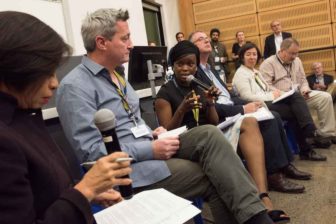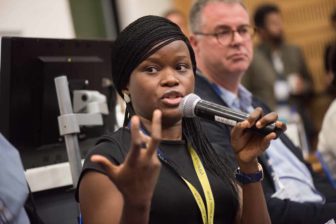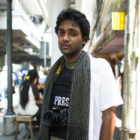
Panelists debate the challenges and opportunities for investigative journalism at the 2017 Global Investigative Journalism Conference: From left: Sheila Coronel, Gerard Ryle, Oluwatoyosi Ogunseye, Stephen King, Maria Teresa Ronderos, and Drew Sullivan. Picture: Daylin Paul
Drew Sullivan, editor and co-founder of the Organized Crime and Corruption Reporting Project (OCCRP), Maria Teresa Ronderos, director of the Program on Independent Journalism at the Open Society Foundations (OSF), Gerard Ryle, director of the International Consortium of Investigative Journalists (ICIJ), Oluwatoyosi Ogunseye, editor of the Sunday Punch (Nigeria) and Stephen King, Partner at the Omidyar Network discussed the future of investigative reporting at the 2017 Global Investigative Journalism Conference. Moderated by Sheila Coronel, Dean of Academic Affairs at Columbia University, here’s the round-up.
Today’s mediascape faces momentous changes, presenting both challenges and opportunities for investigative reporting and journalism as a whole. The 2017 Global Investigative Journalism Conference, held in South Africa, also highlighted another significant issue: the divide between the developed and developing world.
Disrupting the Disruptors
While technology remains key to the future of investigative journalism, the panel highlighted a number of competing issues, in particular the role of social media companies and governments in hindering or censoring the free press.
“Technology is the disrupting force,” said OCCRP editor Drew Sullivan. “The social changes that are coming will be huge. We now have as many programmers as we do editors at our organization and that really speaks to the way we’re all going.”
ICIJ’s Gerard Ryle also emphasized the importance of technology for journalists. “We’re talking about the future of journalism, so what is it? I think you’re seeing it now. You’re seeing technology being used to do better journalism.”
“We’re able to do data mining and analyze information at a scale we never thought possible before. There’s a lot of information out there we’re not using as journalists and we need to get smarter about using it.
Maria Teresa Ronderos of the OSF and Stephen King of Omidyar Network also noted the importance of technology in the future of investigative reporting but they also said it was a double-edged sword.
“We want to know more about the role of technology in providing access to information but also in spreading misinformation and censoring media,” said King.
Sullivan said there was a danger that technology could be used to create obstacles for reporters.
“We may see armies of bots in the future who are capable of analyzing your social media information and have cogent arguments with people mimicking human beings,” he said. “We’ll be competing against an increasingly sophisticated set of tools that are meant to spread propaganda to the public and it will be harder to hear our voice.”
Evolving Business and Funding Models
“A dollar a day keeps the donor away,” Ronderos joked. “But that’s exactly what we’d like to see happen.” She explained that OSF funded networks of reporters, including OCCRP, Arab Reporters for Investigative Journalism (ARIJ), and ICIJ.
“We want to see structures in the field to make journalism sustainable and independent, even from us,” she added.

OSF’s Maria Teresa Ronderos said that they wanted to see models developed to make journalism self-sustaining. Picture: Daylin Paul
“Our industry is dead and we need to redefine it,” said Sullivan. “Commercial funding is going to come from the same way technology companies make their money, by selling API access and similar things.”
He suggested that investigative reporting, as a public service and public good, can transform into “journalism commons” where reporters could get public money, but that would require a re-organization in the way they operate.
Ronderos said she thought rather than the business or funding model being broken that it was the editorial model that was broken but, in her view, reporters were evolving with changing technologies to reconnect with citizens and re-engage them.
Ryle also noted that with all the information investigative reporters gather that there’s also the possibility of selling it.
“For so long we’ve been used to the advertising business model of journalism,” Ryle reflected. “But I think we’ve gone through a period of introspection here because a lot of the journalism we were doing in the past wasn’t very good so we have to ask ourselves: what essential role can we as journalists play in the lives of people?”
“Once we answer that question,” he continued, “we will find the new business model.”
King said that support for investigative reporting will be a joint effort between several philanthropists and not just one. “We’ve committed $100 million over the next three years … to support investigative reporting, tackle misinformation, and support new sources.”
The money is not only in the form of grants but also in equity investments in private media.

Oluwatoyosi Ogunseye from Nigeria’s Sunday Punch newspaper said that accessing donor funds was often difficult for journalists in Africa. Picture: Daylin Paul
“Supporting investigative reporting in the future doesn’t always have to be grants based,” continued King. “We’re exploring different sustainability models.”
Ogunseye said that despite the existence of the grant opportunities it wasn’t always that easy for reporters in the developing world to access that funding.
“We talk about $5 million, $100 million, but our major issue as reporters on the continent is how do we access these grants? This is still a big issue. There are reporters in need but they don’t know how to access the funds.”
“The lack of skills is also a major issue,” Ogunseye continued. “Fundraising skills, how to deal with technology, fact-checking skills, and others that still need to be developed.”
New Philanthropists in Latin America
When asked whether she’d seen more interest in the philanthropic community in funding investigative reporting, Ronderos said she had seen a wave of change in Latin American philanthropists.
“Philanthropists who were giving to hospitals, education and things like that are now realizing the importance of media. They’re going ‘Oops!’ if we don’t have independent media, we have a problem,” she explained.
“We don’t have anyone to hold power to account, we don’t have anybody to disseminate information you can trust because everything confusing right now with these bots and trolls.”
Facing the Political Challenges By Finding Opportunities
The panelists emphasized that an audience for investigative reporting still exists despite the challenges. “With the advent of social media, most journalists in Nigeria are finding a lot of stories are no longer exclusives. Investigative reporting is not very common and absolutely people support good journalism when they see it.”
“We need to restore public faith in journalism,” added King. “There’s a massive distrust of journalism and media. It’s about restoring quality. Philanthropy plays a role but it’s not the silver bullet.”
“I think we are in that period where we need to win back the trust of the public,” added Ryle. “We have a chance to reinvent it now and that’s the future.”
Sullivan believes what appears to be challenges are, in fact, disguised opportunities for reporters.
“It is a fact that many of the people represented in this conference are some of the few voices in their countries needed to serve a population that are underserved and that there will be opportunities in that.
“In the end, I think you only deal with propaganda by having credible news organizations telling the truth to the public in a compelling way,” he said. “We need to start including the evidence with the story and giving the public access to the documents.”
“We can’t beat them in money,” Sullivan said. “But we can beat them with innovation and with the truth.”
 Stella Roque is communications officer for OCCRP and Transparency International’s Global Anti-Corruption Consortium. Prior to joining OCCRP, she was a freelance writer and editor in Paris. She was also a researcher for The Centre for Investigative Journalism in London working with broadcast reporter Andrew Jennings on the FIFA corruption investigation.
Stella Roque is communications officer for OCCRP and Transparency International’s Global Anti-Corruption Consortium. Prior to joining OCCRP, she was a freelance writer and editor in Paris. She was also a researcher for The Centre for Investigative Journalism in London working with broadcast reporter Andrew Jennings on the FIFA corruption investigation.
 Daylin Paul is an independent photographer, visual journalist and photojournalism educator based in Johannesburg. He is the 2017 winner of the prestigious Ernest Cole Award for Photography for his ongoing documentary Broken Land and the 2017 Hostwriter Pitch Prize for Collaborative Journalism. His work has appeared in The New York Times, The Guardian, Foreign Policy, Financial Times and Huffington Post.
Daylin Paul is an independent photographer, visual journalist and photojournalism educator based in Johannesburg. He is the 2017 winner of the prestigious Ernest Cole Award for Photography for his ongoing documentary Broken Land and the 2017 Hostwriter Pitch Prize for Collaborative Journalism. His work has appeared in The New York Times, The Guardian, Foreign Policy, Financial Times and Huffington Post.
